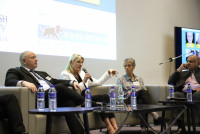NEW TECH such as generative AI (artificial intelligence) is reshaping how we live and work.
Young professionals with digital skills stand to cash in on the inevitable changes AI will bring to the job market. Emerging nations, which can recognise these changes and arm their workforce with those same skills, can ride the wave too.
Researchers forecast a shift towards knowledge-intensive activities, with jobs such as statisticians and software engineers, critical to the development of artificial intelligence systems, being the ones in demand.
They anticipate that employment prospects will increasingly revolve around computing, research, system management, law, engineering, health, architecture and education.
The people doing these jobs are evolving as well. The idea of a graduate leaving university with one set of skills and relying on those skills to stay relevant for 40 years is over.
No longer tied to an office desk in the city, they are gig workers, freelancers and digital nomads, working from home, the local cafe or wherever there is a reliable internet connection.
Although all types of independent workers share elements of independence and flexibility in their working arrangements, they differ in terms of lifestyle, the nature of their work and their relationship with employers or clients.
Gig workers typically perform short-term tasks or projects, and their work is not necessarily location-independent. Freelancers are self-employed and offer their services to clients. They may work remotely, but can also work on-site if required.
Digital nomads use technology to work remotely and live a location-independent lifestyle. The digital nomad visa is new because of this lifestyle.
Proliferation of platforms
Emerging economies are beginning to cash in on these styles of work.
The growing gig economy offers chances for individuals in numerous developing nations to make money, develop fresh skills and connect with professional networks.
A proliferation of new platforms worldwide catering to specialised industries, along with local platforms addressing country-specific demands for both skilled and low-skilled workers, are transforming the global workforce.
Around 12 percent of the global labour market consists of gig workers. There are 545 online gig work platforms worldwide (three-quarters are regional or local), with clients and workers from 186 countries.
Forty percent of traffic to gig platforms comes from low- and middle-income countries.
Asian nations are seizing the chance offered by online outsourcing and remote gig work to generate millions of job opportunities for their people.
The pool of professional gig workers predominantly hails from lower-income countries.
India, Indonesia and Bangladesh, for example, are home to millions of professionals who offer services in web and software development, graphic design, content writing and digital marketing. India alone has around 15 million gig workers in human resources, IT and design.
Array of opportunities
Meanwhile, the number of freelancers worldwide has reached 1.57 billion (47 percent of the global workforce).
The freelance industry in the United States has grown by 78 percent to 73.3 million. This is expected to rise to 76.4 million by 2024, with AI creating new opportunities.
One study shows that 84 percent of freelancers live their preferred lifestyle and 70 percent claim that they choose to work as freelancers to improve work-life balance.
The United States, India and the Philippines stand out as major contributors to the freelance workforce, with Japan emerging as one of the top 10 countries experiencing freelancer growth.
While freelancers in the US primarily secure gig work from local clients, those in developing nations like India, Pakistan and the Philippines rely heavily on overseas clients, accounting for approximately 90 percent of their assignments.
This dynamic presents significant opportunities for job creation, reduced unemployment, and economic advancement in these countries.
Digital nomads now number around 17 million in the US. Indeed, the US accounts for about half of the digital nomad community worldwide.
It is predicted that by 2027, more than half the US workforce will participate in the gig economy.
This growth offers an array of opportunities for gig workers and employers alike. The number of online communities and professional networks providing support, networking opportunities, and a sense of community for gig workers is on the rise.
Training and empowerment
Having access to the external workforce is important for finding rare skills such as blockchain development, quantum computing, sustainable fashion design, machine learning, statistical modelling, data visualisation, ethical hacking, and threat detection.
An increasingly AI-reliant economy underscores the importance of continual reskilling and upskilling for the workforce to remain relevant.
With strategic investments in infrastructure and training, emerging and developing countries can harness AI to compete in the global market and attract employers.
AI-driven platforms have the potential to provide tailored training designed specifically for individuals. These platforms can deliver personalised learning experiences and recommend relevant courses, tutorials, or resources to strengthen candidates' abilities and improve their chances of securing employment.
Additionally, AI will empower individuals with disabilities to utilise their professional skills, integrating them into the country's talent pools and expanding their opportunities for accessing professional jobs through online platforms.
Future employees will need diverse skills, including problem-solving, data analysis, collaboration, communication, relationship-building, and judgment. The education system needs to adapt to produce these workers.
For developing economies, the key lies in establishing a solid foundation through investment in digital infrastructure and nurturing a digitally proficient workforce that can leverage AI for optimum productivity.
Ramifications that cause concern
As for income inequality, job polarisation and unemployment, they are intricately linked to the impact of AI on labour economics. How AI will cause unemployment depends on how quickly people learn the needed new skills (upskilling and reskilling). The faster markets adapt, the less unemployment there’ll be.
There is concern about the potential job displacement caused by generative AI, raising questions about its impact, especially in high-skilled sectors.
However, despite this, high-skill workers have seen improved employment opportunities post-AI emergence. AI exposure correlates with increased job growth in occupations requiring extensive computer use, indicating higher skill levels.
There is also a growing concern that AI benefits may disproportionately favour a select few individuals or businesses, exacerbating income disparities.
Skilled professionals proficient in building, implementing, and managing AI systems may witness increased demand and higher wages, while low-skilled workers may face stagnant pay and reduced job prospects. – 360info, March 2, 2024
Sedigheh Moghavvemi is an associate professor at the Department of Decision Science, Faculty of Business and Economics, Universiti Malaya.
Lee Su Teng is attached to the Department of Management and Marketing, Faculty of Business and Economics, Universiti Malaya.
Published under Creative Commons and in partnership with 360info.org













_president_Muhammad_Azlan_Abas-Najjua_Vibes_pic.PNG)



_president_Muhammad_Azlan_Abas-Najjua_Vibes_pic.PNG)


